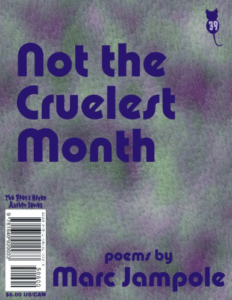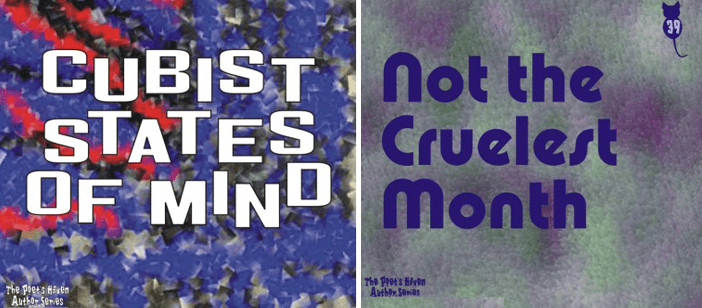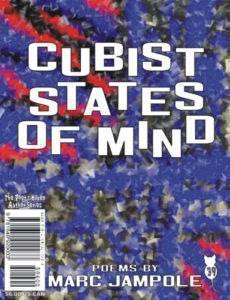Long-time western Pennsylvania poet Marc Jampole returns to Pittsburgh for his first reading since moving to New York five years ago, at White Whale Books on Friday, May 11, at 7:00 pm. Marc will be reading from his new chapbook/flipbook, Cubist States of Mind/Month the Cruelest (Poet’s Haven Press, 2017) and his first book, Music from Words (Bellday Books, 2007)… plus some new poems.
Marc lived in Pittsburgh for almost 30 years, during which time he gave many local readings and participated in a number of poetry workshops. His poetry has appeared in Evansville Review, Mississippi Review, Cortland Review, Recours au Poème, Vallum, Slant, Cutthroat, China Grove and many other journals and anthologies. Over the years, four of his poems have been nominated for the Pushcart Prize. More than 1,800 freelance articles that Marc Jampole has written on various topics have been published in magazines and newspapers. A former television news reporter and public relations executive, Marc also writes the OpEdge blog, which appears on the websites of three national publications. He is president of the board of directors of the leftist magazine Jewish Currents.
Reading with Marc will be Michael Wurster, dean of Pittsburgh community poets and a founding member of Pittsburgh Poetry Exchange, which for more than 40 years has provided venues for poets to exchange their work and ideas about poetry. His books of poetry include The British Detective (Main Street Rag, 2009), The Snake Charmer’s Daughter (ELEMENOPE, 2000) and The Cruelty of the Desert (Cottage Wordsmiths, 1989). He is co-editor of two anthologies, Along These Rivers: Poetry & Photography from Pittsburgh (Quadrant Press, 2008), and The Brentwood Anthology (Lummox Press, 2014). Michael has also published individual poems and reviews in many journals and anthologies. In 1996, Michael was an inaugural recipient of a Pittsburgh Magazine Harry Schwalb Excellence in the Arts Award for his contributions to poetry and the community.
 What comes to mind when you think of Pittsburgh?
What comes to mind when you think of Pittsburgh?
Good times, which is basically what I enjoyed the 28+ years I lived in Squirrel Hill. I came to Pittsburgh knowing no one, and the city, including the poetry community, accepted me with open arms. I owned a business, bought two houses and raised a son in Pittsburgh. It’s a beautiful city with a vibrant poetry community and I’m delighted to return to it.
What books are on your night stand?
As far as poetry goes, Alicia Ostriker’s Waiting for the Light and The Old Woman, the Tulip, and the Dog, as I will be reading with her and two other New York poets on May 17; plus James Nicola’s Wind in the Cave, which I am reviewing for American Book Review, and the Library of America’s complete John Ashbery, which I am slowly making my way through. For prose, it’s Greater Gotham, a 1,000+ page history of New York City, plus two very early graphic novels: Max Ernst’ 1929 exercise in surrealistic collage, The Hundred Headless Woman, and Citizen 13660, a Japanese-American girl’s illustrated story of her time in an American concentration camp for citizens of Japanese origin.
I had a writer’s block writing poetry for 10 years in the 1990s. All the while, I was able to write news releases, articles, brochures, advertising, billboards and websites with no problem, but I was severely blocked when it came to creative work. In my case, the perfect was the enemy of the good. I had always been an edgy, experimental poet. I wanted to keep pushing the boundaries of poetic language and syntax, but I had run out of fresh ideas, at least for the time being, and felt inadequate using my same old bag of poetic tricks. During my 10-year silence, I grew very frustrated and very unhappy because I define myself by my poetry and other creative writing, not by my commercial writing. Finally I decided that I couldn’t be unhappy anymore, so I just started writing what I thought was pretty ordinary stuff. But after a few months, I started coming up with fresh ideas, points of view, rhythms, structures and images. I was back in the groove! While I have had minor blocks since then, I have learned just to work through them. Just keep writing, even if you think it’s a bunch of dribble. You can always toss it out. But the way out of a writer’s block is to write.
CUBIST WONDER
It lasts a second, this wondrous jolt
when eyes rebel against the binocular
and share a piece of time with space,
share astonished trapezoids of joy
pushing things together, pulling planes apart:
blues and greens intersect at random angles,
eyebrows raise and curve like Gothic arches,
horizontal wrinkles cross the forehead,
lips are parting, eyelids open, mouth goes slack
in spheres and cubes of gray and pink,
collage of creamy Delphic space that fills you
with the warmth of fleet existence opened to itself,
the vastness of the oceans, the movement of the stars,
as colored shapes unshackle from the preconceived.
STORM MUSIC
A conference of birds:
cardinals, wrens and blue jays
perch together on a leafless branch.
I search for words in blurry chirps
and high-pitched brays
that bend and break apart,
contemplate where inside ends
and outside starts.
Later in the day I hear the music of the storm—
those weighted liquid thuds—
as silent fall, as white noise,
as rhythm, baseline, glassy sonata,
as full orchestra—thousands of instruments,
hundreds of parts—the cool atonal play befriends
the night, contemplates where inside starts
and outside ends.
A BUBBLE OF DAMP TRANQUILITY
A muggy ocean breeze
teases with its wheezes
glides between the buildings,
reminding us the seas are near.
It fills the streets with sticky nuzzles
and the puzzle of the clouds:
will it drizzle, will it drench,
will it shroud the roads with fog
undulating emerald over
square and circle beds
of pink and yellow heads,
blinks of purple hid in clover.
Twists of conversation ride the wind—
well I mean like so anyway you know
you see no way it’s like I go—
meaningless as the chirp of birds.
Invaded by a damp tranquility,
water hangs in air,
a soothing shadow blanket
reminiscent of another April years ago,
not déjà vu, but déjà senti
A burst of sun will break it up
as if it were a bubble.
Excerpted by permission of the author. All rights reserved. No part of this excerpt may be reproduced or reprinted without permission in writing from the publisher.


























